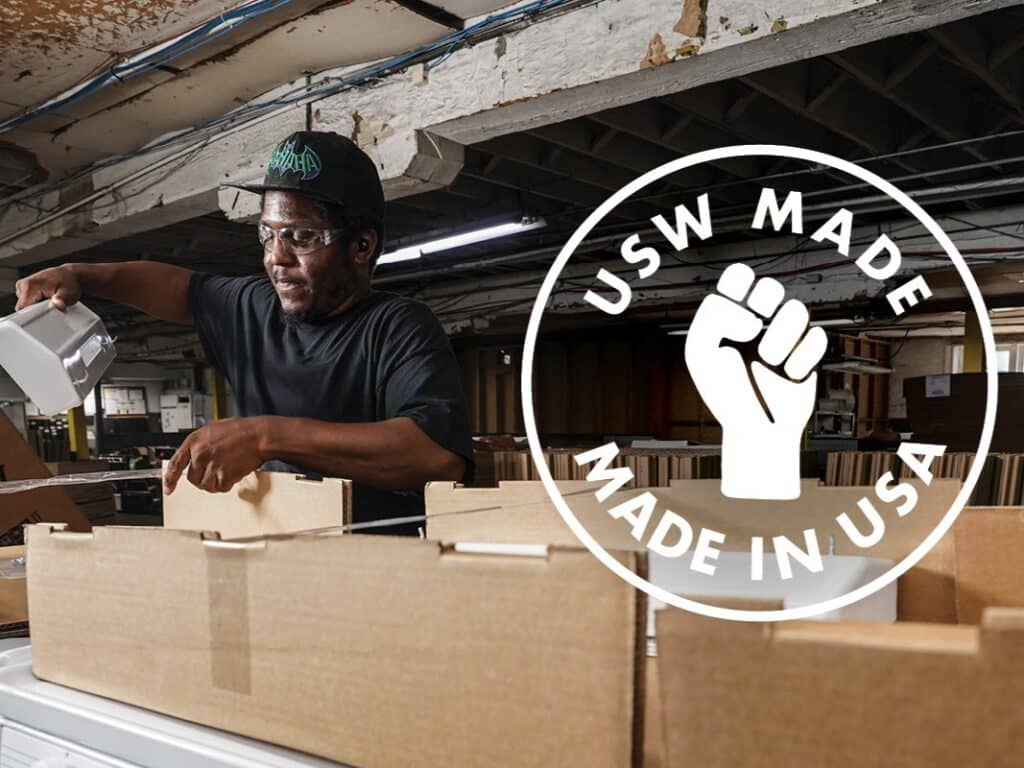Building the Future: Infrastructure Law Will Benefit USW Members in Countless Ways

When President Joe Biden signed the $1.2 trillion Infrastructure Investment and Jobs Act into law on Nov. 15, it marked the biggest single U.S. investment in physical infrastructure since the creation of the interstate highway system in 1956.
The new law also opened the door to new opportunities for thousands of USW members to contribute to rebuilding the country.
“Our members stand ready to produce the essential building blocks of a modern infrastructure, as we begin making long-overdue upgrades to the nation’s roads, bridges, broadband, public transit, ports, power grids, and more,” International President Tom Conway said following the passage of the new law. “These investments will help American workers, including hundreds of thousands of USW members, not only by making their communities safer but by promoting widespread job growth and economic opportunity.”
Victory for Workers
The passage of the infrastructure act was a major victory for USW members, who had led the way for years in calling on leaders in Washington, D.C., to invest heavily in federal projects to grow the economy from the ground up and bring the nation fully into the 21st century.
President Biden made the bill one of the cornerstones of his agenda during his 2020 campaign for the White House, and the USW launched a campaign last year called “We Supply America,” that culminated with a 2,300-mile bus tour of local unions to call attention to the vital contributions that USW members make each day to the nation’s infrastructure needs.
“Washington has for years promised this type of once-in-a-generation infrastructure investment, but until now has failed to deliver,” said International Vice President David McCall. “Thanks to the vision and leadership of President Biden, Congress has come together, finally, and passed a bipartisan bill that will directly benefit American workers and ensure a strong future for the next generation.”
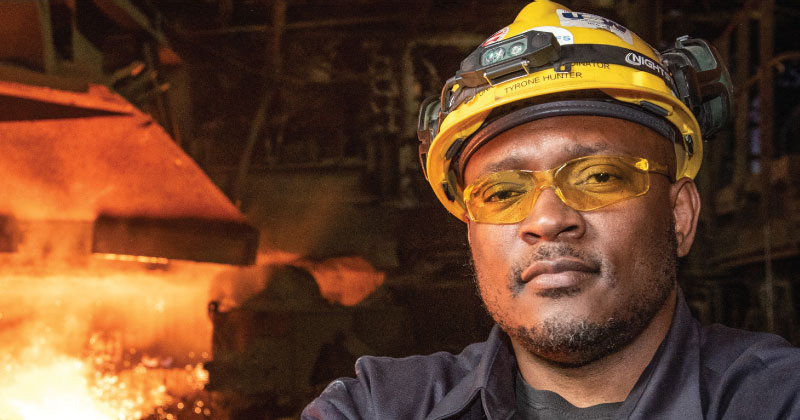
Local 6787, Burns Harbor, Ind.
Among the workers who can see that future first-hand is Pete Trinidad Sr., president of Local 6787 in northwest Indiana, where the local economy is tied in many ways to the success of the steel industry.
Trinidad represents about 3,300 members at the Cleveland-Cliffs Burns Harbor facility who produce steel used in the transportation, construction, shipbuilding and automotive industries, among others.
“Steel is crucial for infrastructure,” Trinidad said. “It forms the backbone of our nation.”
Trinidad and his fellow Steelworkers in Northwest Indiana have long been at the forefront of the USW’s campaign to secure major infrastructure investments. Those years of work meant that Trinidad was among the workers invited to witness, in person, President Biden’s signing of the bill last November at the White House.
“It made me proud,” Trinidad said. “The president personally thanked the Steelworkers for leading the fight over the years, and other unions recognized the Steelworkers as being at the forefront of this fight.”
Steel forms the economic foundation for families, businesses and communities in Burns Harbor and other similar towns across the United States, said Trinidad, who grew up in the area and has worked at the Burns Harbor mill for 27 years under four ownership groups. He said the infrastructure bill provides a sense of security for workers.
“Immediately what it will do is it will protect the jobs that we have,” he said. “Down the road it will create jobs.”
Even before the new law took effect, Cliffs was already hiring about 20 new workers per week at the plant, Trinidad said, and that number should only increase as planning gets under way for new infrastructure projects.
“Cliffs is investing in training workers and in capital and equipment,” he said.
Those investments will pay dividends for residents, businesses and organizations throughout Northwest Indiana, he said.
“Steelworkers – we are the baseball coaches, we are the wrestling coaches, we are the volunteer firefighters,” said Trinidad, who spent years working as a police commissioner in nearby Portage, Ind. “Steelworkers don’t just participate in their communities. We are the community.”
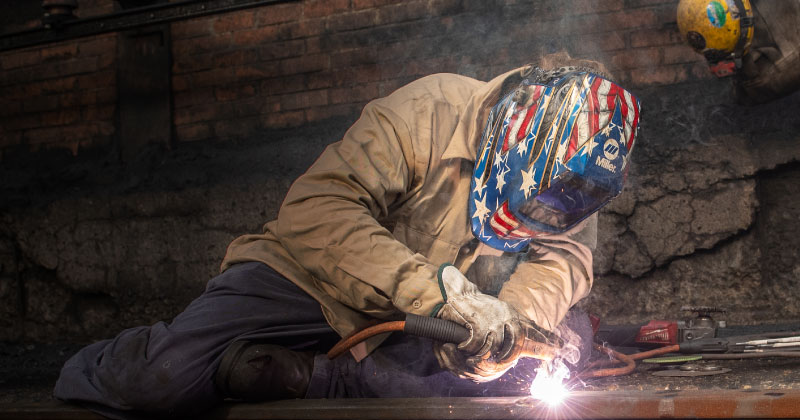
Locals 4950 and 4974, Negaunee, Mich.
Just down the road from the USW local union hall in Negaunee, Mich., marks the spot where iron ore mining began in Michigan’s Upper Peninsula following the discovery of the first deposits in 1844.
From then on, the people of Negaunee, now known as “Iron Town,” have depended on iron and steel for their economic well-being, and the mining industry, in turn, has depended on the people of the Marquette Range. Since 1850, when it was chartered in Michigan, Cleveland-Cliffs Inc. has been there, too.
Today, the company, its workers and the surrounding community are all looking forward to the shot in the arm that the new infrastructure law will provide, both in the jobs it will secure for USW members and other workers, and in the economic benefits it will have for the region.
“To say mining is ingrained in our community would be an understatement,” said Michael Grondz, training coordinator for Local 4950, which represents Cleveland-Cliffs mine workers and others in the region. “This is where it started, and we take a tremendous amount of pride in it.”
Because so many of the projects in the infrastructure law will require steel made in America, Tricia Anderson, president of Local 4974, expects the recent uptick in hiring at the Cleveland-Cliffs Tilden Mine to continue.
“This has been our first hiring in quite some time,” Anderson said. “It all starts here. We want good U.S.-made steel made from our ore.”
The Tilden mine is one of two USW-represented iron ore mines in the area. The other, Cliffs’ Empire mine, just a few miles away, was idled in 2016. There is still plenty of ore there, but it was then deemed too expensive to extract.
Grondz is hoping the company changes that assessment with the increased demand created thanks to hundreds of billions of dollars in new infrastructure projects.
“Every chance we get, we bring it up,” he said of re-starting the Empire facility.
The region’s economy, including local townships and school districts, suffered from a decline in business and tax revenue when the mine shut down, Grondz said.
“We’re still feeling that ripple effect today,” said Local 4950 President Chad Korpi, noting that the jobs added as a result of the infrastructure act would have the opposite effect.
“It’s going to be a boon for our industry,” Korpi said.
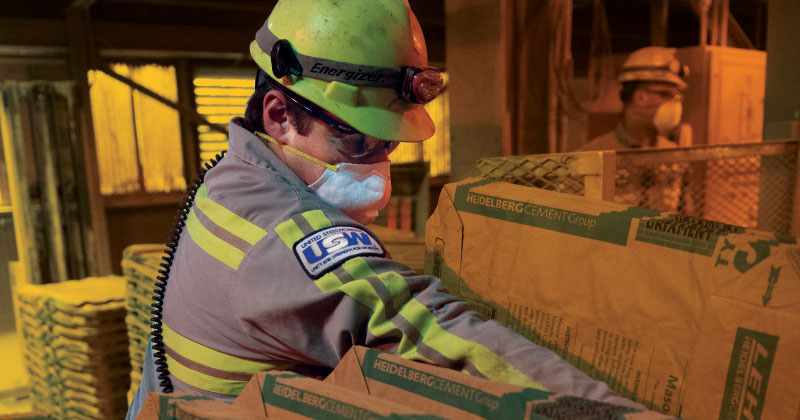
Locals 2102 and 3267, Pueblo, Co.
The members of Local 2102 and 3267 at Evraz in Pueblo, Colo., expect to see a similar boon for their community, known as the “Pittsburgh of the West,” as a result of the new law.
“This positions us in a very good place,” Chuck Perko, president of Local 3267, said of the infrastructure investments that are on the way. “Across the board, the products we make here are going into infrastructure in some way or another, so I am excited.”
Those products include steel used in railroad construction, rebar used to fortify roads, bridges and buildings, and tubular goods used both in the oil and gas industry and in various construction projects.
Perko, a fourth-generation steelworker, said that the new investments will make jobs like his at Evraz, already “some of the best jobs in the state,” even better.
Moody’s Analytics predicts that, by 2025, the new law will create at least an additional 872,000 jobs, many of them in manufacturing and construction.
To Perko, whose local represents about 150 clerical and quality-control workers at Evraz, the $110 billion planned for road and bridge construction, along with $66 billion in passenger and freight rail upgrades, represent future jobs and job security for workers throughout Pueblo.
“We have a lot of small business here,” he said. “Keeping more employees making that union wage means more business for everyone.”
Evraz is one of only two mills in the United States that makes the type of rail needed for long projects, Perko said.
“Manufacturing is still the big economic driver in this town,” he said.
Local 2102 President Eric Ludwig, who represents Evraz production and maintenance workers, said strict “Made in America” provisions are an important part of making sure the $1.2 trillion infrastructure package directly benefits U.S. workers.
“We have seen our city build a bridge with imported rebar when we make the exact same thing in town,” Ludwig said. “So that is a key stipulation.”
Local 11-205, Hannibal, Mo.
Strict Made in America rules could mean more jobs, and greater job security, for members of Local 11-205 at Continental Cement in Hannibal, Mo. The members there create the “glue” in concrete, which plays a part in the foundation of almost every physical infrastructure project in the country.
The company increased its sales last year significantly enough that it is considering doubling its production capacity by adding a second production line to keep up with continuing strong demand, said Chris Dietle, Local 11-205 president, an electrician with Continental for 17 years.
“There are several countries in the world that produce a surplus of cement that can be imported into the U.S.,” Dietle said. “Therefore, ‘Made in the USA’ stipulations help us keep our customers from buying elsewhere.”
That means more jobs, more thriving families, more successful businesses, and a brighter future for everyone in the Hannibal area, he said.
“Having good-paying union jobs means more members spending money and paying taxes in the community,” Dietle said. “If we double our production capacity, that would create even more good union jobs.”
Local 1025, Wilmington, N.C.
At the White House on Nov. 15, as President Biden was preparing to sign the infrastructure bill into law, Local 1025 President Donneta Williams kicked off the ceremony, all the while wearing her USW “We Supply America” sticker, with remarks that touted the innumerable contributions of USW members.
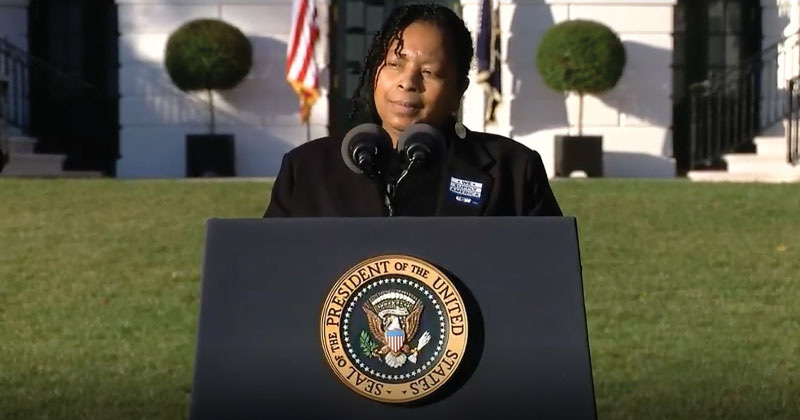
“Our members and the Steelworkers throughout our great union supply America,” Williams said. “That’s why I was so proud to join them in helping to pass this bill.”
Williams and her 325 USW siblings in Wilmington produce optical fiber, the backbone of broadband internet service, which carries voice, data and video to U.S. households, schools and businesses.
As the pandemic made painfully clear, the availability of high-speed broadband remains grossly uneven, and even some of Williams’ co-workers have been unable to access it for their own families.
The infrastructure act earmarks $65 billion to extend affordable, high-speed broadband internet to underserved communities across America.
“This is not just an investment in broadband internet,” Williams said. “It’s an investment in jobs and in my fellow North Carolinians.”
The new law, Williams said, will provide more access to the internet for underserved communities, security for Corning’s current work force, and a bright future for the next generation of USW members.
“Investments in infrastructure are critical to workers like me and to my brothers and sisters in other industries,” she said.
“Everyone benefits,” she said, noting the infrastructure program will create and sustain millions of union manufacturing and construction jobs while modernizing the nation and revitalizing its manufacturing base. “It’s not about one particular party or one particular person. It’s about the nation as a whole and our future and what can be accomplished when everybody works together.”
Essential USW Workers
Besides the critical need for infrastructure investment, another fact that became clear during the pandemic, and that also was emphasized throughout the “We Supply America” campaign, Trinidad said, was how important the work of USW members is to the security and success of the nation as a whole.
Whether they are steel, iron ore and cement workers producing the building blocks of roads, bridges, schools and railways, paper workers providing essential home goods, health care workers helping patients battle a deadly virus, or oil workers making sure the nation can meet its energy needs, USW members are a critical part of moving the United States forward.
“When they talk about essential workers, they talk about doctors and nurses, and they should,” Trinidad said. “But we are essential workers too, and we’ve proved that through the pandemic.”
That fact will become increasingly clear, he said, as the nation digs out from the economic consequences of COVID-19 and begins to rebuild its physical infrastructure after so many years of inaction.
“We are essential in a different way,” Trinidad said. “We’re essential to this nation’s strength and its viability and to our ability to live our day-to-day lives.”
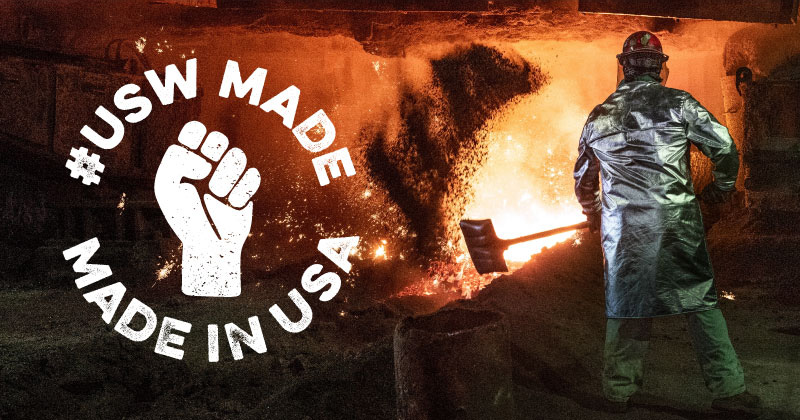
By clicking Sign Up you're confirming that you agree with our Terms and Conditions.
Recent News Articles
Want to Learn More?
See how the USW is making a real difference in our communities and our workplaces.

